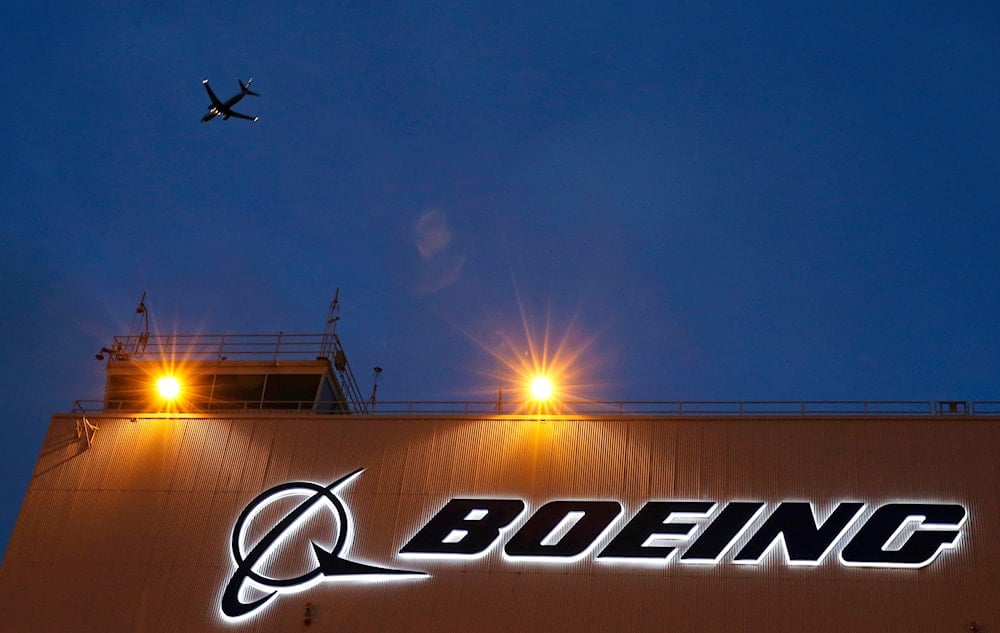Boeing jet returns to US from China, a victim of Trump's tariff war
A Boeing 737 MAX jet destined for China’s Xiamen Airlines returns to the US as tariffs imposed by the Trump administration and Chinese retaliation disrupt aircraft deliveries and renew tensions in the aviation industry.
-

An airplane flies over a sign on Boeing's 737 delivery center, on October 19, 2015, at Boeing Field in Seattle. (AP)
A Boeing 737 MAX jet originally intended for China’s Xiamen Airlines returned to the company’s US production hub on Sunday, becoming the latest casualty of escalating US-China trade tensions.
The aircraft’s rerouted delivery highlights the renewed disruption facing the global aerospace industry amid tariff-related complications.
Xiamen airlines jet lands back at Boeing field
The jet, bearing the livery of Xiamen Airlines, landed at Boeing Field in Seattle at 6:11 p.m. local time (01:11 GMT). It had completed a 5,000-mile (8,000-kilometer) return trip from China, with refueling stops in Guam and Hawaii.
The aircraft was one of several 737 MAX jets stationed at Boeing’s Zhoushan completion center, where final delivery preparations are typically made before handover to Chinese customers.
The return flight comes just weeks after Trump raised baseline tariffs on Chinese imports to 145%. In response, China imposed a retaliatory 125% tariff on US goods.
Analysts note that such tariffs would severely impact any Chinese airline accepting delivery of a Boeing jet, given that a new 737 MAX has a market value of approximately $55 million, according to aviation consultancy IBA.
It remains unclear which party, Boeing or Xiamen Airlines, initiated the aircraft’s return.
Duty-free aerospace trade
The incident underscores growing uncertainty over the future of Boeing’s Zhoushan facility, a key part of its strategy to serve the Chinese market. The Zhoushan center was once symbolic of US-China cooperation in aerospace, but it now faces operational challenges amid shifting geopolitical dynamics.
The U-turn also marks a broader breakdown in the aerospace industry’s long-standing duty-free status. Industry experts warn that changing tariffs could leave many aircraft deliveries in limbo. Some airline executives have reportedly indicated they would defer aircraft purchases rather than pay the newly imposed duties.
Boeing has only recently emerged from a five-year import freeze on 737 MAX deliveries to China, triggered by earlier safety concerns and trade disputes. The latest developments risk stalling that fragile recovery as tensions flare again.
With no clear resolution in sight, both the US and Chinese aviation sectors face increased uncertainty. Analysts warn that continued confusion over tariffs may lead to further delivery delays, complicating fleet planning for airlines and disrupting the global aircraft supply chain.
On a related note, China’s Commerce Minister Wang Wentao warned, according to a statement from the ministry released on April 15, US tariffs will “inflict serious harm” on poorer nations.
The warning came amid escalating tit-for-tat tariffs between Washington and Beijing, fueling concerns of a deepening trade war between the world’s two largest economies in a conflict that has rattled global markets.
Economists caution that disruptions in trade between the closely linked US and Chinese economies could drive up consumer prices and potentially trigger a global recession.

 3 Min Read
3 Min Read










